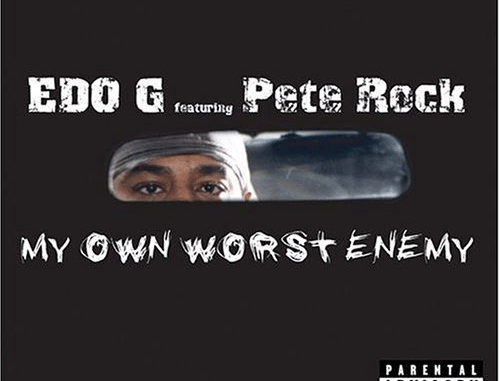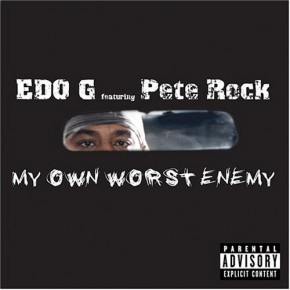
 |
Artist: Edo G
Album: My Own Worst Enemy Label: Fat Beats |
Edo G. is not trying to get any younger on his latest offering. My Own
Worst Enemy is not about some old dude trying to make a comeback. The
comeback is finished, and Edo’s not trying to prove anything. He’s just
showing you what he is. And he’s showing you that getting older isn’t a
setback. This is grown-up shit, and amidst an industry too prevalent
with music made for 16-year-olds, it’s damn refreshing.
One of the strengths of the album is Edo’s return to a rule that has
accompanied his best album work: stick to one DJ or production team.
His debut, the 1991 commercial hit Life of A Kid in the Ghetto,
utilized the production of the Awesome 2 family; his 1993 follow-up,
the relatively unsuccessful Roxbury 02119, used the same production
team on several tracks, but added the Diggin in the Crates production
of Diamond D for most of the other songs. After falling off, then
emerging again on compilations and guest spots, Edo returned with The
Truth Hurts in 2001. A fine exhibition of Edo’s skills, it was
unfortunately somewhat diluted by the eclectic collection of producers
featured on the album – few of whom approached the stellar quality of
DJ Premier’s lone track, the single “Sayin’ Something.” Edo’s next
album, Wishful Thinking, was significantly shorter than The Truth
Hurts, but, produced almost completely by DJ Supreme One, it
successfully electrified Edo’s lyrics with a consistent funk-heaviness.
So it’s not surprising that My Own Worst Enemy is produced
predominantly by one DJ/producer: this time, the seemingly ageless Pete
Rock.
And it works. Pete Rock brings his signature jazz-induced
stylings to the album, a departure from the funk of Wishful Thinking,
and Edo’s harsh, deep staccato vocals juxtapose the smooth, minimalist
production of the Soul Brother #1. Refreshingly, there’s no singing on
this album: all the hooks and choruses are either plain rapping or
sample-driven. It’s just MCs spitting and DJs producing, and it proves
that an album of just pure hip-hop can be so fucking good. Also
reminiscent of hip-hop albums from an earlier era, all the guest
appearances are from those firmly within Edo’s camp. A frequent
contributor is Jaysaun, a member of Edo’s new Special Teams group (as
well as his own outfit, The Kreators), emerging as an apt pupil who
invokes Edo’s abrupt, direct style. He sounds young, but perhaps that’s
on purpose: Edo comes across as a mature veteran on the album, and one
thankfully unobsessed with his star status. Instead, he uses the album
as a reflection on his life, an opportunity to imbue the youth –
hopefully including Jaysaun – with the lessons it has given him. Edo
got screwed label-wise after the initial success of Life of a Kid in
the Ghetto before resurfacing on the independent/underground circuit,
so the album itself is a demonstration itself of the evolution of his
personal business approach.
The lessons Edo brings to the album do not necessarily set it
apart: keep learning about yourself and the world around you, don’t
fuck up, don’t fuck with me, work hard, don’t forget where you come
from, and above all, be honest. The honesty of the album is one of the
reasons this album is special. On the first track, “Boston,” Edo
actually cites why people might be skeptical as to whether he’s still
relevant, and then addresses their concerns with real answers, not just
fuck-yous. No one I can think of does this. “Your second joint / a sad
sequel / you an old school rapper / who mad feeble” – that’s Edo
talking about himself: he’s confessed that he liked some of the tracks
on his sophomore Roxbury 02119, but that he felt several of its songs
were just filler. He doesn’t refute that here, but several lines later,
addresses such naysayers “I’m a throwback from the nineties / whose
return is timely / for hip-hop consciousness that’s grimy.” Next verse:
“My work ethic dispersed effort from my worst to my first effort /
There’s a madness to my method / it’s universal / my music / is
underground and commercial / wholesome and controversial.” He’s not
relevant because he used to be something; he’s relevant because of what
he has to say now.
Pete Rock, a veteran of the same era Edo blew up in, also demonstrates
early on in the album why he’s still relevant. “Boston” is a guaranteed
head-nodder, “Just Call My Name” speaks on why the talents of Edo,
Jaysaun, and Pete should not be taken for granted, and “Voices” –
although at first sounding so relaxed as if to potentially signify a
downturn in the album – picks up as Edo fills in the spaces between the
slow beat with the melancholy reflections of a man who knows his past
mistakes but is trying to get his life right, despite internal and
outside forces acting against him. But then Track #4 hits. And when I
say it hits, that’s no metaphor: it slaps you in the face. From the
Busta Rhymes sample that marks the beginning of the song, this shit is
LIVE. Frenetic, bouncing-off-the-walls shit. If ever there was an
example of how easily Edo could resign himself to merely manufacturing
club hits, this is it. The next track, “Streets is Callin,” could in
fact be a rejection of the prospect of pandering to the dance floor, as
it returns to the sit-at-home listening sound of the first three songs.
Perhaps that quick transition is itself another lesson: Edo has stated
in interviews that the hip-hop divide he sees between “commercial”
songs and those produced for college-age fans of
underground/independent hip-hop boils down to whether songs make you
want to dance. The quick transition between the two here serves as a
reminder to his head-nodding audience that there’s more to club tunes
than they give credit for.
But while the politics of My Own Worst Enemy is subtle through
the first six tracks, those of “Wishing” blow you over. You know this
song is going to be different when Masta Ace opens with “I wish the
president would stop lying / I wish black babies would stop dying” The
song offers a telling contrast with Jadakiss’s hit “Why” from earlier
in 2004: both songs are overtly political, and both rely on a single,
line-opening phrase to drive the song. I liked “Why,” but while Jada
asked questions without providing answers, these verses – from two
hip-hop elders – present problems without the youthful naiveté that
seeks immediate answers. The two MCs here couple their political
thoughts with mournful reflection. There are no easy solutions to all
the problems Edo and Ace present on this song – to satisfy many of
them, the audience, and the people of world, must simply evolve into a
better, more mindful, population. This is anti-Bush without being
propaganda, as Edo breaks his politics down to the language, and logic,
of the streets and of events in his life: “I wish I didn’t get searched
when I come through customs / I wish Christians’d stop beefing with
Muslims / Wish the poor didn’t have to take welfare / Wish America had
universal healthcare.” One of the reasons this song is so powerful is
its combination of the personal and the political. That the lines “I
wish my pops didn’t die when I was seven years old” and “I wish I’d
been more diligent” are expressed with as much emotional weight as
anti-Bush, anti-discrimination statements shows us how much this stuff
means to Edo. Once considered a “conscious” rapper, this is the only
song on the album that hearkens back to the idealist political themes
of many of rap’s golden-age acts. And it’s the only one that we need,
it’s just that good.
The next two songs, “Right Now!” and “Stop Dat,” return to the
lesson-giving, don’t-fuck-with-me-cuz-I’m-that-good-and-here’s-why
themes presented so adequately by Edo and Pete earlier in the album.
But just as you get a little relaxed – a little comfortable – with the
smooth “Stop Dat,” the thump hits again with “Revolution.” A hard beat
coupled with a captivating piano-synth loop and guest producer DJ
Revolution’s samples of Edo himself, it ends up being the perfect
conclusion to the album, as Edo raps accurately how, in case you hadn’t
already figured it out by now, he ranks among the pantheon of hip-hop.
He does not, however, shy away from the cynicism pervasive throughout
the album, about the state of rap as well as the state of the world.
Who but a cynic would have the gumption to end his album with “Fuck
rappin / cuz the best things happen / to the people who make the best
of what happens / without jaw flappin, scrappin / not enough soldiers
and too many captains / I got a rare gift…”? Perhaps this is why the
album was entitled My Own Worst Enemy: because Edo G. recognizes that
his relative success due to hard work cannot be duplicated by anyone
who works hard – that he is, in fact, lucky to have this rare gift, and
that his success is a double-edged sword when attempting to teach the
youth. The world simply cannot accommodate all the ambition within it.
As much as that “if you try hard enough” bullshit is fed down our
throats, trying hard does not guarantee success. Edo G., you know this.
Thanks.


Leave a Reply